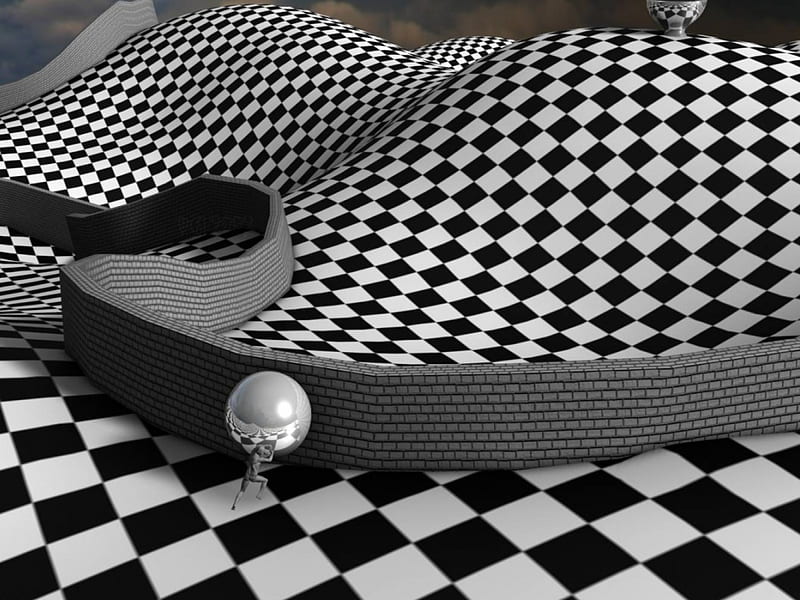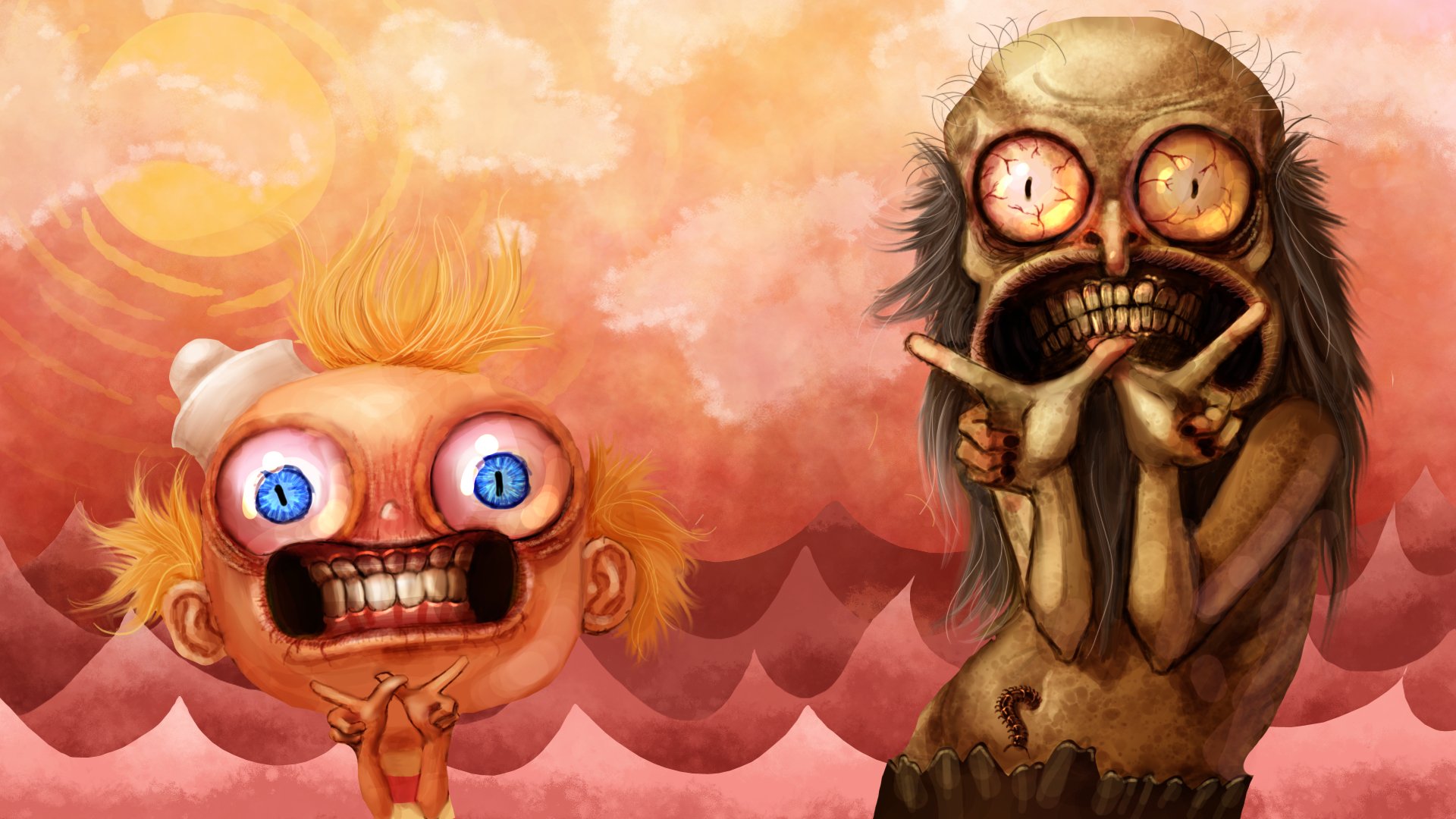One very simple way to explain depression is to say that it is what happens when we are cut off from the source of meaning in our lives. So what exactly is this thing that we have become disconnected from? There are different names that people use to talk about it but when it comes down to it the names are not important. What is important is to understand the nature of this source. The main thing we can say about it is that it is independent of us, i.e. it is spontaneous rather than directed. What this means is simply that it is not something that we construct for ourselves in order to protect ourselves or make ourselves feel better, but rather it is something which stands outside of our likes and dislikes, our hopes and fears. Basically, it isn’t our responsibility – it happens by itself, it comes from somewhere beyond our control and understanding. It is like a fountain or stream that gushes out of the rocks way up in the mountains or hills somewhere, and which flows constantly downhill to nurture the creatures and plants that live on the slopes and valleys. It is precisely because spontaneous processes do happen by themselves, according to their own law not ours, that makes them a source of meaning.
Why would we get cut off from this spontaneous source of meaning? How could that happen? One answer is to say that we get cut off because we don’t trust the stream of inspiration to flow by itself. Somewhere along the line, we ‘take charge’. It is as if we say to ourselves “This is too important, too precious, to be left to chance. I have to manage it, safeguard it – I need to control it and regulate it.” For this reason, I damn the valley, I dig canals and build a system of locks and sluice-gates. I exploit the natural flow of the stream for my own purposes. Because of this tendency to take control, I end up replacing the independent (or ‘natural’) source of meaning with my own construct (or with society’s construct, which comes to the same thing).
What this means is that the genuine article (which is the natural light of life) gets gradually replaced by a counterfeit product – by an artificial substitute. The psychologist Carl Jung explains this by saying that reality gets replaced by the products of our rational mind, which is to say, our thoughts about reality. Because this substitution takes place so slowly and gradually we don’t actually notice the switch taking place, but it occurs all the same, and as it does we drift imperceptibly away from the dynamic stream of life into the mental backwaters of our beliefs, our ideas, theories and thoughts. We are too busy adapting to the world as we understand it to ever stop and reflect if there is more to life than we have assumed. Life becomes a closed book, a foregone conclusion.
The first stage in this process of ‘adaptation’ is a busy and sometimes exciting time. We see glimpses of what we can hope to achieve in life and due to the pressure to succeed in our goals (or the fear of failing) we become more serious and less ‘playful’ than we would have been before we started on this all-important business of adaptation. Somehow, we become committed to a certain path (or certain direction) and it becomes less and less possible to question this direction, to ask ourselves if this is really what we want. There is a point at which “How?” drives out “Why?” In other words, instead of spending a bit of time reflecting on why my goals are so important to me, I get preoccupied with the adaptive question of how I can best achieve these goals. Eventually, I become unable to question myself in a deep way, and only able to worry (which I do) about the superficial details.
INTERNAL AND EXTERNAL MOTIVATION
What has happened as a result of this substitution of “HOW” for “WHY” is that the original source of meaning (which as we said is not my rational mind) is replaced by the meaning which comes out of my ideas about what is important and what is unimportant. We can also explain this by talking about internal versus external motivation. When we are children the main type of motivation that we have is ‘internal’, which is to say, we do things because we are naturally and spontaneously interested in doing them. Of course, even when we are children there are things that we have to do, such as go to school or tidy our bedrooms, but alongside this external (or compulsive) motivation there is usually a healthy amount of internal motivation. As we get older the balance changes however and eventually, as adults, we tend to find that almost all of the stuff that we do is because we ‘have to’ do it, rather than because we genuinely ‘want to’ do it. Eventually, we find that even our leisure time (what we do for fun) has become a serious business. In other words, I have an agenda to enjoy myself; I no longer leave it to chance – it has become too important a need for me. When fun becomes something that I take too seriously (when I get anxious about having a good time or avoiding a bad time), then I ought to know that a vital ingredient in my life is missing. The child in me has died.
We can also explain this ‘substitution’ idea by talking in terms of habits. Generally we start off doing something purely for fun, or because we enjoy it or find it useful or helpful. I don’t have to do it, I want to do it. Years later, however, I am still engaging in this pattern of behaviour, only now it has turned into a habit, a ‘have to’. Habits are pure external motivation, just as smoking a cigarette is pure external motivation – it is motivation that is imposed on us from the outside. If we continue with the example of smoking we can see that the reason I smoke a cigarette is not because I genuinely want to, but because I am forced to by the strength of the habit. There is a compulsion operating which works by making me feel bad if I don’t have a smoke when the urge comes on me. There are of course any number of different habits that we pick up and they are all external motivation; sometimes it might be that we enact the habit out of a sense of duty, more often it is simply because we have been doing it so long that we don’t feel as if we have a choice – I do it this way because I have always done it this way, because it feels too strange or too uncomfortable not to do it this way. Basically, I just don’t have the courage to change.
LOSS OF JOY
We might want to ask why exactly it should be such a bad thing to spend my time in the HOW? mode rather than the WHY? mode. Why can’t we just settle down and live life in a way that we are comfortable about? Why should we have to get all philosophical if we don’t want to? Well, we have of course already answered this question right back at the beginning of this discussion when we talked about ‘loss of meaning’. When life gets too easy, too routine, too well known a territory, then what we are living is not life at all because life, by its very nature, is a challenge. When life gets too comfortable then we know that what we are living is not life but a game, i.e. an oversimplified (or surrogate) version of life.
Real life, life which has not been managed and made predictable, is challenging, but it brings with it the joy of the unexpected. Essentially, it is a journey – it is what Jung called the longissima via, the ‘long journey’. Managed life is life that proceeds along well-established tracks. This never brings us in contact with the unexpected; in fact that is the whole point of it – it is designed specifically to protect us from change, from the unknown. Instead of joy, this type of life provides us with periodic ‘satisfactions’, moments of relief or pleasure that occur when our needs are successfully serviced (or met). In between these euphoric interludes there is a sort of ‘barrenness’ that we just have to get through, a barrenness which in time threatens to turn into full blown depression. Instead of the genuine meaning of life, which has to do with the continuous movement into the new (i.e. personal growth), there is only the meaning of ‘fulfilling my needs’. In other words, I am driven by the desire (or greed) to obtain my known goals, and the negative desire (or fear) of what will happen if I don’t obtain these goals. For this reason, along with the constant threat of depression lurking in the background (due to the loss of genuine joy), there is also anxiety, because I am driven by fear, not by curiosity (or love).
I CAN’T ENGINEER THINGS TO BE NATURAL
This explanation of depression makes sense, if we are willing to look at things this way, but does it help us to understand what we have to do in order to get back in contact with the source of joy and meaning in life? Well, the first thing to say is that we have a great tendency to believe that it must be possible to return things to how they ought to be by goal-driven thought and goal-driven activity. This is the great mistake that we make. It is a mistake because rational intervention is one thing that cannot help us. Why this should be so is easy to see if we think about it. If the problem is that I by ‘managing’ and ‘controlling’ I have lost contact with the original and spontaneous source of my inner life, then how can I possibly think that I can get back to the natural state of affairs by yet more managing and yet more controlling? If I have messed everything up by interfering, then there is no way that I can cure matters by further interfering. Interfering was the wrong road to go down in the first place – if I have engineered all sorts of artificial canals and water-ways to shunt the stream of life down, then I cannot correct this by yet more ‘engineering’, because the more engineering I do, the more artificial it gets, i.e. the further it gets from the natural state of affairs.
The answer is not to try to correct the predicament that I am in, but to take the time to appreciate the true nature of the predicament, and to appreciate very thoroughly the fact that I cannot ‘manipulate’ my way out of it. My attempts at manipulation are only driven by fear anyway, which means that they are externally motivated. This motivation is no good to me at all, in fact it is the very root of my problems. Instead of acting purposefully, what helps is to see first-hand the barrenness of routine or habitual existence, and to see that there is no handy routine or method to get out of it. To see this takes genuine courage, and genuine sincerity, and so once I have found it within myself to see my situation as it really is, then I am already free from the unreflective reflex-driven pattern of living that got me into trouble in the first place. What I learn then is that my inner life sorts itself out naturally, like a muddy pond that clears of itself when I stop interfering with it. The urge is to ‘keep trying to fix’ which only makes matters worse because I only dig a deeper hole for myself as a result. What helps is to actually see this fact, which means that instead of trusting in my own cleverness to get me out of my predicament (which the ancient alchemists called the ‘way of error’) I learn to trust the process itself. This is the way that the philosophers of old called the via veritas, or ‘way of truth’.
Image – wallpaperflare.com







Frank M.
Hey Man , right now I feel very depressed and to be honest I just don’t know why . I had a panic attack 3 days go ( severe ) after 7 years of recovery ( no panic attacks ) . What surprises and terrifies me is the fact that the day after I felt as if joy and pleasure had left me; ALL IN ONE DAY . I ask you because somehow , something inside of me tells me it makes no sense at all. I’d really like to hear your opinion on this
P.S . – My life prior yo this attack was very happy ( had lots of goals and joy on a daily basis )
Nick Williams
Hi Frank,
Most people who have depression don’t ‘know’ why they are depressed or have become depressed I think – if you felt depressed and clearly understood why (something that happened to you) then this would not be depression but just a response to events. So the fact that it makes no sense at all to you is very normal because that’s how it happens. I do think that there is a ‘reason’ behind depression all the same but it is not we can understand in a logical sense. For me (and this is only my opinion) depression is a sign of growth not a pathology as we usually understand it – the thing being that we all cling to a sense of identity long past the point at which this notion of who we are no longer serves us. It used to be right for us but no longer is but we carry on just the same. What happens then is that the things we used to enjoy doing and the goals we used to value cease to work for us and everything feels sterile and joyless, as you say. Eventually we let go off that old sense of identity and find that we have changed as a result, and it is this sort of change that we are resisting. We always resist change, this is a universal thing. If our goals continued to be motivating to us then we would stick with that old sense of identity forever and never change, but then we would be fighting against our own growth. From my experience working with people over the last 25 years ‘resisting our own growth as human beings’ is what we all do – growth is an amazing thing and this is what makes life meaningful but at the same time the ego-self resists it with everything it’s got. It resists to the hilt. I know this way of talking about depression doesn’t offer any quick fix but the general idea that we don’t need to buy into a pathological narrative about how there is something wrong’ with us or that we are broken or damaged is extremely useful because an awful lot of suffering is caused by our narrative of what is going on. I don’t if this makes any sense but do get back to me.
Frank M.
Thank you. I’ve been thinkimg about everything you said; It rings true . Deep down something inside of me tells me not to resist.
Thanks again Nick , your blog Is the most enlightening site I’ve found in regards to mental health .